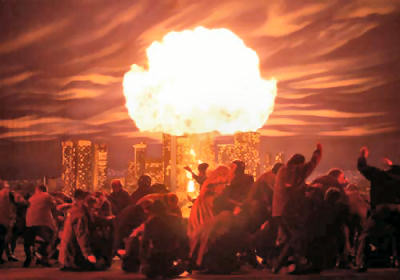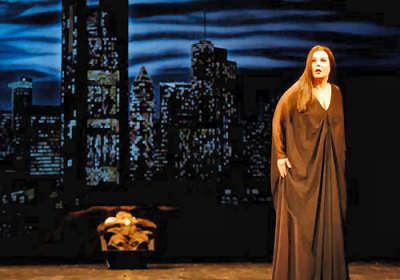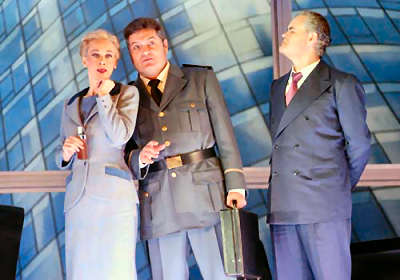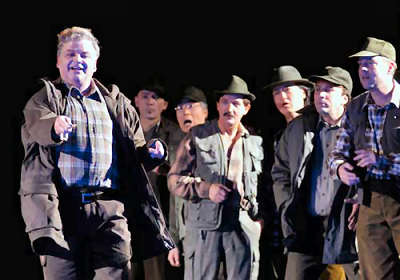Wagner,
Götterdämmerung:
soloists,
orchestra and chorus of the Staatstheater Wiesbaden/Marc
Piollet, conductor. Premiere on 13.11.1005 (SM)
Siegfried: Alfons Eberz
Gunther: Joachim Sepp
Alberich: Carlo Hartmann
Hagen: Christoph Stephinger
Bruennhilde: Barbara Schneider-Hofstetter
Gutrune: Ute Doering
Waltraute: Andrea Baker
1st Norn: Andrea Baker
2nd Norn: Ute Doering
3rd Norn: Annette Luig
Woglinde: Emma Pearson
Wellgunde: Sharon Kempton
Flosshilde: Sandra Firrincieli

How many times in a lifetime can one director
sensibly take on the huge challenges represented by the
Ring? John Dew, who tackled the sprawling four-opera masterpiece in
Krefeld in the 1980s to some critical acclaim, this week
completed his second stab at the cycle, this time in Wiesbaden.
To be honest, even Dew himself admits that the
new project is more a "reconstruction" of the
Krefeld staging than a brand-new take. But for those of
us who weren't around to catch the previous production,
Dew's reading, which he has cleverly updated to great effect,
remains as relevant as it was back then. The anti-nuclear
theme of the 1980s when CND had its heyday is still there
in Rheingold,
where Walhalla is a nuclear power station, and Loge is Albert
Einstein. And in Götterdämmerung,
Dew widens the scope to the catastrophic effects of global
warming when the Welt-Esche is nothing but a stump of a
giant tree, symbolizing the destruction of the rain forests.
Admittedly, in the current era of Regietheater,
Dew's updating of Götterdämmerung
to the 21st century feels as if it has been done hundreds
of times before. Siegfried and Brünnhilde are yuppies who
live in an expensive sky-rise apartment full of the latest
designer goods (I spied an Alessi kettle and espresso machine).
The Gibichungs are powerful bankers or corporate executives,
with Gutrune leafing distractedly through the latest edition
of Vogue, while Gunther wheels and deals via mobile phone
and laptop computer. Grane is not a horse but some sort
of swishy sports car, only hinted at when Brünnhilde hands
over the keys (complete with horse key-ring) to Siegfried
so that he can set off on his Rhine Journey. Nothung is
similarly reduced to the size of a slick, designer penknife.
And the hall of the Gibichung itself is one of the glittering
skyscrapers in the financial district of downtown Frankfurt,
Germany's financial capital.

That may all sound terribly gimmicky. But the
strength of Dew's direction, as in the earlier parts of
the tetralogy, lies in the personal interaction between
the characters and the utterly credible acting by what is
-- for such a small, provincial theatre -- a very respectable
cast of singers.
Siegfried (Alfons Eberz) is arrogant and smooth-talking,
almost slimy, in his pin-stripe suit, completely at ease
in the power-lunching world of the Gibichungs. Eberz has
improved immensely since he sang Siegmund in Wiesbaden's
Die Walküre in
2004. There are still traces of the bark that set my teeth
on edge back then and in his Parsifal in Bayreuth this year.
But he has learned to scale down the volume and soften some
of his tenor's harsh metallic glare. It is still by no means
a beautiful voice. But he can hit even the highest notes
with almost disarming ease and he revealed an intelligence
in acting that I previously failed to credit him with.

Joachim Seipp's dark-timbred Gunther is a well-mannered
thug, completely believable as he gets increasingly out
of his depth in Hagen's deadly game plan. Ute Doering's
light, bright soprano is well-suited to Gutrune. And Hagen
himself (Christoph Stephinger) is sinisterly evil, plotting
the gods' downfall from his bare, windowless bunker.
In Barbara Schneider-Hofstetter, Wiesbaden has
found a Brünnhilde who is up to the superhuman demands of
the part without sounding forced or shrill and even finds
room for careful shading of her voice before the final cataclysm.
Andrea Baker was an urgent, driven Waltraute. And Carlo
Hartmann's Alberich was excellent, a real seed-bag of a
tramp.

In one serious miscalculation, Dew brings Brünnhilde
and Wotan (The Wanderer) together in a distractingly teary-eyed
reconciliation during Siegfried's funeral march, only to
fall out again for ever when Wotan tries to wrest the ring
from the hand of the slain Siegfried. And I'm sceptical
about setting the final catastrophe so concretely in Frankfurt,
with a (real) fireball that sears the city's skyline marking
the gods' final downfall. Is Rheingold
now going to have to be renamed "Maingold"
after the river that runs through Germany's financial
capital? But the final picture as the curtain comes down
of a new sapling growing out of the stump of the Welt-Esche
is as effective as it is simple.
Perhaps the real key to the success of Dew's production
is musical -- Wiesbaden's new GMD, Marc Piollet, is working
wonders in the pit. After just one season, the orchestra,
which tended to sound so rough-and-ready under Piollet's
predecessor Toshiyuki Kamioka, is now a joy to hear, infinitely
securer in intonation, more concentrated, with much more
delicate and luscious string-playing and some excellent
woodwinds. Apart from a few missed notes in the horns, it
sounds like a completely different orchestra to the one
that played in Das
Rheingold when Wiesbaden first embarked on its new
Ring in 2003.
Now that all four parts have been staged, the
Staatstheater is preparing to put on two complete Ring cycles next year.
Dew's Wiesbaden production might not be the Ring to end all Rings -- plenty of boos and whistles greeted him and his team at the
curtain call. But it's intelligent and carefully thought-through
and I, for one, will be queuing up to see all four evenings
next spring.
Simon Morgan
Photographs
© Staatstheater
Wiesbaden.






